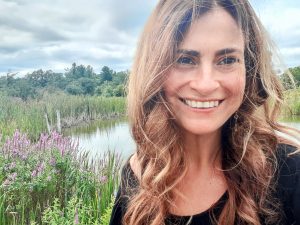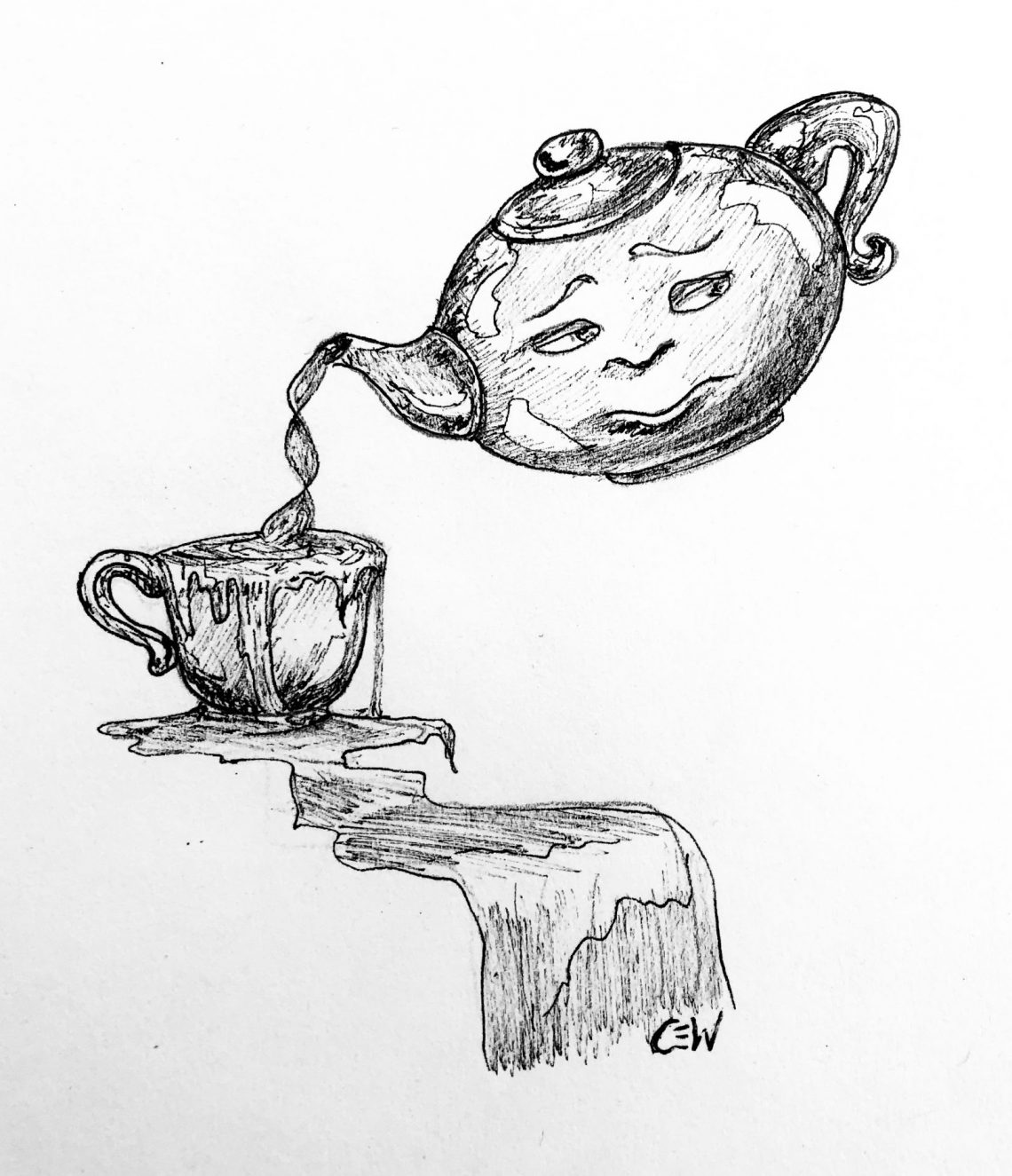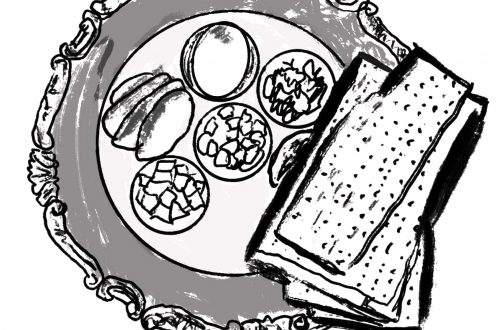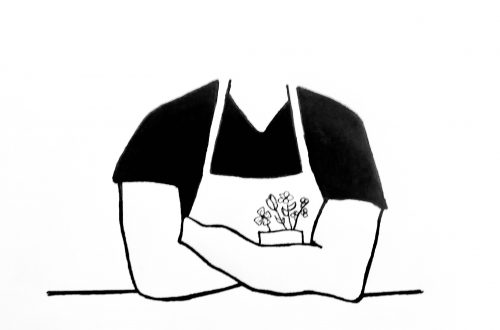by Elana Rabinowitz
Elana’s essay appears in episode 36 of The Dirty Spoon Radio Hour.
When my niece was little, I spent endless hours with her cross-legged on the floor drinking imaginary glasses of tea out of small white china cups. “Cheers!,” we’d both say, clinking our glasses together. Something about this game of make believe was a comfort. It felt as if we were really having warm tea and conversing. It is one of my fondest memories of being an aunt. But of my own childhood, I have no such nostalgia.
My parents both worked and went back to school to study various levels of psychology which, for them, meant no time for tea parties, and for me, meant little supervision. When I’d get home, I’d go directly upstairs to our attic and create a world of my own using wooden blocks to construct fortresses so thick and sturdy, no one could break in and knock them down.
I didn’t mind it really. It was all I knew. It’s something most of my generation is familiar with. We were latchkey kids – independence was encouraged. But while I frolicked around without constraint, I still felt something missing. Why weren’t my parents more involved in my life?
It was my mother who first suggested I see more, do more. She encouraged me to travel and see the world. At first, I started off small, leaving New York City for Vermont, Atlanta, San Francisco. In my twenties, I volunteered in Sri Lanka where I spent my free time sipping Ceylon tea smothered in powdered milk and sugar. The villagers gathered their best yellow glasses for this ritual, which brought me the warmth of tea and comfort. It was through these sips and moments of connection that I began to feel closer to the ones I left behind.
Two years later, I returned to the states and traded in fresh ginger tea for lattes in paper cups that dripped out foam when I ran for the subway. Now it was time to once again hit the pavement and find a job, a home – start anew. This was something I was used to as a traveler, starting over, but it was still a challenge trying to find my place – my home. Friends were now married and having children, and relationships, for me, were problematic. I was still focused on adventure, trying to bring my imaginary worlds to life, and to break down the fortresses I’d built up around me.
Eventually, I tried therapy. I’d enter my sessions grasping cold cups of coffee to sip throughout my 50 minutes. The therapist at the other end of the couch, or more aptly the chair, would always delve deeply into my childhood, looking for clues for failed relationships and general malaise. And every time they would blame my parents, usually my mother, for not being there.
“Is it really all my parent’s fault?” I would ask.
But these therapists, with fancy degrees framed on their walls, were convinced. I grew to believe them. It was easier that way.
Soon I began to challenge my counselors, in part because I was raised by my parents to think for myself. What did these strangers with degrees really know about me or my family anyway? Why was freedom associated with neglect when it made me the person I am? I would leave each session more confused and hurt, often sobbing when the therapist would look at me in my red swollen eyes and say, “We have to stop now.” I would leave their offices with a surplus of emotions and no place to put them.
One day I made a conscious decision. I didn’t want to dig and examine and blame any longer. I wanted to simply live, and live with ease. I wanted to build connections and work to construct the relationship to my family I always felt was missing. When I thought about everything I did have, all that I didn’t have seemed silly really. There they were right in front of me, making me lavish dinners, offering advice. I began to try and navigate and create my own world, just as I did in the attic as a child.
I often visited my parents for long weekends during the summer and did what they had planned.
As a guest I always believed the host called the shots. But if I was to change our dynamic, I had to start with me, and my needs. Instead of staying home and repeating the same conversations couldn’t we now follow the advice they had given me all those years ago? To see the world, to explore a new town, a new adventure?
My parents are now in their 80s and not up for hiking, but still quite mobile. We agreed to take a drive to a nearby town that served high tea. My father drove and his usual anxieties became apparent. “What do I do? Where do I turn?” he’d yell, stubbornly and tenaciously, still refusing the aid of a GPS. My mother calmly reassured him and got us to the small New York town. We walked around for a while making our way to the tea shop.
The place was out of a movie set, with chandeliers lighting the room. The tables were decorated with white lacey linen and China etched in tiny flowers. The menus were tomes written in curling calligraphy and had endless lists of teas and snacks. I ordered a pot of orange Pekoe tea and scones with cream. While waiting, my mother and I walked around the gift shop in the back filled with scented candles and embroidered signs. She asked me what I wanted.
I wanted so much in my life. I wanted to be married with children, but that was now unlikely as a woman in her forties. I wanted to have friends that wanted to go on adventures and I wanted a job where I felt useful not used. And at that moment, I wanted the lavender scarf with the tassels at the end to keep me warm this winter. My mother happily purchased it with a smile.
As we sat at our table, sipping our tea, a young family came in and were seated near us. They wandered over to the other end of the shop where you could grab silly hats and wear them with your tea if you so desired. The whole family partook as if it was the most natural thing in the world. Sitting in the middle of upstate New York, drinking tea in top hats and fedoras. Their tea party rivaled the best of them, I thought.
My mother, seeing me watch this family, convinced me to try on hats as well. It seemed silly. I was too old for this! But when I placed the large black hat with the floppy flowers on my head I didn’t want to take it off. I wore it through three cups of tea and two scones. I sat there and talked to my parents and laughed. At that moment, I realized I finally got my tea party, and this one felt even more special. I had both my parents sitting next to me; alive and healthy and sipping tea.
Tea in all its soothing qualities has a way of bringing people together, slowing them down and allowing them to be in the moment. I looked at my parents, beaming with pride as I sat there drinking my brew – knowing they did their best and it was my turn now. Time had not run out but rather had been steeped and strained for years until it was ready to be released.
The warm act of sharing tea brought us together in a way that was long overdue. I find that in a family of Freudians it is best for me to leave psychology behind when we meet. In the end I am just a daughter, and they are my parents, and that is the relationship in front of me. One filled with crazy hats, anxiety, and adventure. One I no longer want to trade. Like the mad hatter said at his tea party, You’re entirely bonkers. But I’ll tell you a secret. All the best people are.
Thank you for raising me to be free and pave my own way in the world.
Original artwork by Claire Winkler
About the Author







